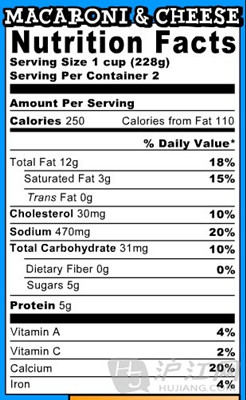(单词翻译:单击)

小编物语:你在实用进口食品的时候有没有因为复杂的标签而惆怅呢?让我们学会看标签,吃的明明白白!
1 Serving Size
食用份量
Each Nutrition Facts label lists its item's serving size and the number of servings per package. It's important to understand the number of servings in a package so you don't eat more.
每一个营养标的列表上都有成分的食用份量和每包的份量。知道每包的份量能避免吃的过多。
2 Calories
卡路里
The label notes calories, too. Calories are a measure of how much energy a serving of food provides. If one serving equals 200 calories but you ate two servings, then you consumed 400 calories worth of energy.
标签上也会标卡路里的量。卡路里是用来测量每份食品内有多少能量。如果一份食品相当于200卡路里,但你吃了两份,那么你就摄入了当于400卡路里的能量。
3 Nutrients
营养成分
The food label provides two groups of nutrients: nutrients you should limit (fat, cholesterol, sodium) and nutrients you should have (fiber, vitamins, minerals). Cutting out saturated fats and sodium while increasing vitamin and mineral content should be a focus when reading food labels.
食品标签含有两组营养元素表:你要限制的营养元素(脂肪、胆固醇、钠)和你要摄入的营养元素(纤维、维他命、矿物质)。当看食品标签时,要注意选择含脂肪和钠少的而维他命和矿物质多的食品。
4 Daily Value Percent
日摄取百分比
Food contains a percentage under the label's heading Daily Value or DV, which is set at a 2,000-kilocalories average. The percentages on a food product reflect the recommended amount at a 2,000-kilocalorie daily level.
在标签的日摄取百分比或DV的标题下面有一个百分比量,它是设定在2000大卡的平均水平上。食品上的这个百分比表示每日建议的摄入量是2000大卡。


